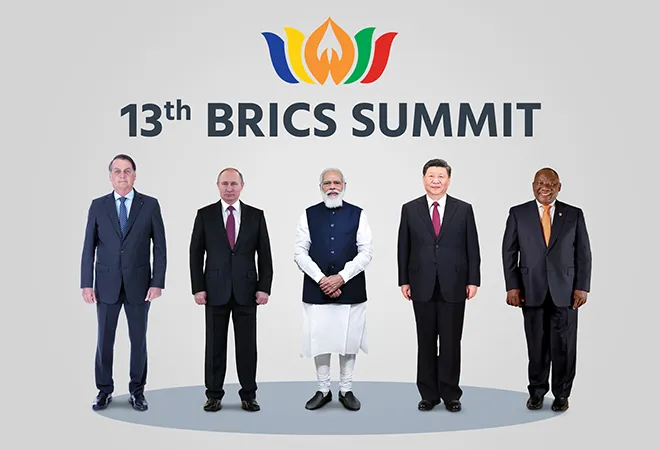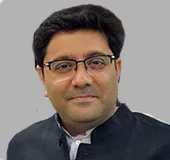-
CENTRES
Progammes & Centres
Location
Critique of BRICS is logical and natural but can be unfair without careful examination of its evolution and contribution

The BRICS Leaders’ Summit, hosted by the Indian Prime Minister Narendra Modi on 9 September, 2021, marked the 15th year since the BRIC first met in St. Petersburg, Russia along the sidelines of the G8 Outreach Summit in July 2006 (South Africa became a full member in 2010). This year, India has hosted nearly 150 meetings under its presidency, over 20 of which were at the ministerial level, and 50 more are expected to be held by the end of the year. The outcomes are published in 40 reports and communiques accompanying the final New Delhi Declaration.
The summit invokes reflection amongst scholars and experts, on whether BRICS still matters as a plurilateral forum in world affairs.
Each year, the summit invokes reflection amongst scholars and experts, on whether BRICS still matters as a plurilateral forum in world affairs. Those questioning its relevance usually cite three reasons for the failure of the grouping. One, that it was an artificially, unnatural grouping to begin with due to the difference in national political and economic systems, and that the forum was a highly successful marketing initiative by Goldman Sachs which wanted to lure investors, not shape geopolitical or geoeconomics. Second, that China is a misfit, an outlier, because of its economic size and aggressive geopolitical ambitions. BRICS no longer reflects the multipolarity it was born with but instead is overshadowed by China’s rise and their dream of a G2 world. For Indians, the intrusion by the Chinese troops into the northern border only underlined this reality. Third, that the forum has no outcome to show for itself for all the hundreds of meetings it has held over the years. In particular, the reform of the Bretton Woods system— the International Monetary Fund (IMF), World Bank, or even the World Trade Organisation (WTO)—which the BRICS promised to deliver are still pending. The tireless reminders from officials that it is the only plurilateral grouping in the world to have a bank of its own, has not been able to change that perception.
Critique of BRICS is logical and natural but can be unfair without careful examination of its evolution and contribution. For instance, the ‘Joint statement on strengthening and reforming the multilateral system’ published by the five foreign ministers on June 1, 2021 is a seminal communique documenting the views and ‘guiding principles’ on how the multilateral system should be reformed. The ministers unabashedly called the system to ‘adapt to the realities of today’s world’, in effect challenging the mandate and focus of the multilateral institutions to focus on issues of today instead of being guided by the geopolitical and geoeconomics challenges that shaped the institutions after Second World War. This builds on Prime Minister Modi’s remarks at the Raisina Dialogue earlier this year, when he suggested that the post-War institutions were designed only with the objective of ‘preventing a Third World War’, which may have reduced the chances of large-scale wars, but the institutions have fallen short in solving underlying problems faced by humanity such as climate change, pandemics, and proxy wars.
A BRICS Counter-Terrorism Working Group was launched and BRICS Counter-Terrorism Strategy adopted last year under the Russian Presidency which includes, amongst other things, collaborating on intelligence, pursuing the Comprehensive Convention on International Terrorism (a priority for India), mitigating terrorist financing and more.
By now, it should be clear that BRICS wants to reform, not reject, the existing multilateral institutions. The centrality of the UN was reaffirmed, again, by the ministers in the statement. They called for better representation and accountability for developing countries through all the organs of the UN system, including the United Nations Security Council (a priority and popular issue for India) but also the UN General Assembly and Economic and Social Council – all of which seem to be in stasis and unable to deliver on global issues. Developments in Afghanistan have best highlighted the impotency of the UN system. South Africa’s President Ramaphosa specifically called for a seat for Africa at the UNSC during his address at the BRICS Summit this year.
Admittedly, BRICS would have benefitted from such a common view on multilateralism in the early days of its formation. Back then, the five nations could not agree to even nominate a joint candidate for the IMF in 2011. Pressurising the West for initiating IMF Quota reforms and launching the Financial Stability Board, which originally had only one seat for non-G7 country, was all it could get the West to accept.
But last week’s expansion of the New Development Bank (NDB) membership to include UAE, Bangladesh, and Uruguay should be welcomed if not that NDB has nearly 80 projects worth US $30 billion underway on sustainable development projects. A consensus is also gradually building on the text-based negotiations taking place on the Intellectual Property Rights (IPR) waiver proposal that India and South Africa are seeking with 60 other nations at the WTO to enable mass production of vaccines. This shows that BRICS is still trying to stitch an ‘alternate global financial architecture’ we had all once hoped.
What has gone unnoticed is the transformation of BRICS from an economic forum to a strategic plurilateral. At the Summit, Russian President Putin explicitly called on BRICS to focus on Afghanistan. The formal dialogue on international security began with the meeting of BRICS National Security Advisers (NSA) in 2016 (under India’s presidency then), and has gradually developed into an important track. Over the years, a BRICS Counter-Terrorism Working Group was launched and BRICS Counter-Terrorism Strategy adopted last year under the Russian Presidency which includes, amongst other things, collaborating on intelligence, pursuing the Comprehensive Convention on International Terrorism (a priority for India), mitigating terrorist financing and more. The security agenda has become critical even for Brazil and South Africa. Brazil has introduced an anti-terrorism law in 2016 and an anti-terror financing law in 2019.
There are initiatives on cross-listing derivatives on exchanges, developing a credit-rating agency, developing a framework for e-commerce and trade in services, research on blockchains, developing a network of science parks, and even inter-linking libraries and museums—on which there have been deep, meaningful dialogues but have fallen short of actionable agreements.
Of course, central to any such conversation will have to be India’s bilateral relations with China. This year, the BRICS High Representatives responsible for National Security met in August 2021 to approve the BRICS Counter-Terrorism Action Plan. The meeting was led by Ajit Doval, India’s NSA and saw participation of Yang Jeichi, China’s highest ranking party member responsible for foreign affairs, who led the talks with the US in Alaska, and General Nikolai Patrushev, Secretary of the Security Council, who was recently in Delhi to discuss developments in Afghanistan. Details of the Action Plan are yet to be released but it is clear that BRICS is gradually developing as a forum for discussing geopolitical affairs.
Understandably, mere statements and action plans are insufficient for those looking for measurable outcomes. Perhaps, some of the ideas proposed in the early days were too ambitious, definitely complex, even impractical. There are nearly 100 initiatives that BRICS has launched since its inception, including memorandums, roadmaps, action plans, and forums. There are initiatives on cross-listing derivatives on exchanges, developing a credit-rating agency, developing a framework for e-commerce and trade in services, research on blockchains, developing a network of science parks, and even inter-linking libraries and museums—on which there have been deep, meaningful dialogues but have fallen short of actionable agreements. Other deliverables this year include agreements on agriculture research, innovation, energy cooperation, remote sensing, and customs—many of which are genuine attempts to find common ground on non-controversial issues. Clearly, there is a need to consolidate and streamline the agenda if BRICS wants to be more effective as a forum. It will be worth observing what change the new Terms of Reference adopted by the BRICS Sherpas this year for future intra-BRICS cooperation will bring.
A BRICS Platform on Digital Public Goods, being discussed as a repository for open-source technologies created by BRICS members that can help developing nations with achieving SDGs, is a novel idea.
During dialogues at the BRICS Academic Forum, the official Track II of the BRICS forum, experts converged on a few ideas that are worth exploring. For instance, the BRICS nations seem to be collectively doing better than their G20 and OECD counterparts on many green indicators, a feat not acknowledged in the global climate narrative. Similarly, there were suggestions to focus on ‘sustainable consumption’ which is usually ignored as an SDG critical to address climate change, on which BRICS nations fare better due to our moderate lifestyles. Another suggestion was to explore how BRICS nations are likely to be affected by the changes in global supply chains, particularly the shifts induced by western multinationals on which all the nations are individually dependent, even more so than on each other.
Meanwhile, this year, by making cooperation in technology and digitalisation for achieving the SDGs a priority, India seems to have found its calling. It should even become a priority for India’s agenda in 2023 when it chairs the G20. The Indian government is keen on sharing its experience with digital public goods such as CoWin (a COVID-19 vaccine registration app) and Aadhaar (unique identity) with the developing and developed world as a model worth emulating, despite the teething issues which were considered avoidable irritants. A BRICS Platform on Digital Public Goods, being discussed as a repository for open-source technologies created by BRICS members that can help developing nations with achieving SDGs, is a novel idea.
BRICS @15 is markedly different from its early years. It is more mature with its processes, less exuberant about impractical collaborations, and cautiously optimistic of itself as a platform for shaping global governance. This makes it a relevant player in world affairs when most of the other multilateral forums are increasingly becoming dysfunctional.
The views expressed above belong to the author(s). ORF research and analyses now available on Telegram! Click here to access our curated content — blogs, longforms and interviews.

Akshay was the Director of ORF Mumbai and Head of Geoeconomics Studies Programme at ORF.
Read More +